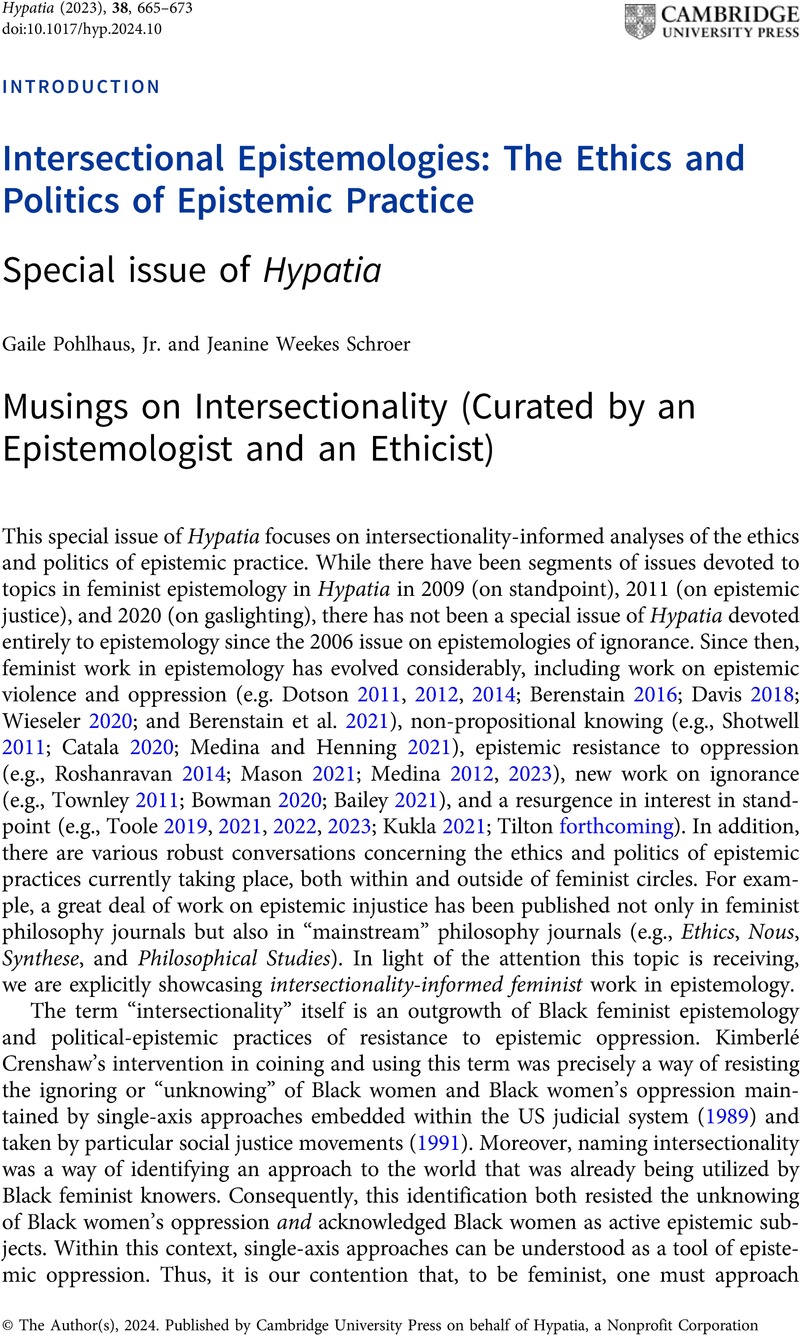No CrossRef data available.
Article contents
Intersectional Epistemologies: The Ethics and Politics of Epistemic Practice
Special issue of Hypatia
Published online by Cambridge University Press: 25 March 2024
Abstract
An abstract is not available for this content so a preview has been provided. Please use the Get access link above for information on how to access this content.

- Type
- Introduction
- Information
- Hypatia , Volume 38 , Special Issue 4: Intersectional Epistemologies: The Ethics and Politics of Epistemic Practice , Fall 2023 , pp. 665 - 673
- Copyright
- Copyright © The Author(s), 2024. Published by Cambridge University Press on behalf of Hypatia, a Nonprofit Corporation
References
Alcoff, Linda. 1991. The problem of speaking for others. Cultural Critique 20: 5–32. https://doi.org/10.2307/1354221CrossRefGoogle Scholar
Bailey, Alison. 2021. The weight of whiteness: A feminist engagement with privilege, race, and ignorance. Lanham, MD: Lexington Books.Google Scholar
Berenstain, Nora. 2016. Epistemic exploitation. Ergo: An Open Access Journal of Philosophy 3: 569–90. https://doi.org/10.3998/ergo.12405314.0003.022Google Scholar
Berenstain, Nora, Dotson, Kristie, Paredes, Julieta, Ruíz, Elena, and Silva, Noenoe K.. 2021. Epistemic oppression, resistance, and resurgence. Contemporary Political Theory 21 (2): 283–314. https://doi.org/10.1057/s41296-021-00483-zCrossRefGoogle Scholar
Bowman, Melanie. 2020. Privileged ignorance, “world”-traveling, and epistemic tourism. Hypatia 35 (3): 475–89. https://doi.org/10.1017/hyp.2020.25CrossRefGoogle Scholar
Catala, Amandine. 2020. Metaepistemic injustice and intellectual disability: A pluralist account of epistemic agency. Ethical Theory and Moral Practice 23 (5): 755–76. https://doi.org/10.1007/s10677-020-10120-0CrossRefGoogle Scholar
Crenshaw, Kimberle. 1989. Demarginalizing the intersection of race and sex: A Black feminist critique of antidiscrimination doctrine, feminist theory and antiracist politics. University of Chicago Legal Forum.Google Scholar
Crenshaw, Kimberle. 1991. Mapping the margins: Intersectionality, identity politics, and violence against women of color. Stanford Law Review 43 (6): 1241–99. https://doi.org/10.2307/1229039CrossRefGoogle Scholar
Davis, Emmalon. 2018. On epistemic appropriation. Ethics 128 (4): 702–27. https://doi.org/10.1086/697490CrossRefGoogle Scholar
Dotson, Kristie. 2011. Tracking epistemic violence, tracking practices of silencing. Hypatia 26 (2): 236–57. https://doi.org/10.1111/j.1527-2001.2011.01177.xCrossRefGoogle Scholar
Dotson, Kristie. 2012. A cautionary tale: On limiting epistemic oppression. Frontiers: A Journal of Women Studies 33 (1): 24–47.CrossRefGoogle Scholar
Dotson, Kristie. 2014. Conceptualizing epistemic oppression. Social Epistemology 28 (2): 115–38. https://doi.org/10.1080/02691728.2013.782585CrossRefGoogle Scholar
Fauconnier, Gilles, and Turner, Mark. 2003. Conceptual blending, form, and meaning, Recherches en Communication 19: 57–86.CrossRefGoogle Scholar
Frye, Marilyn. 2000. Essentialism/ethnocentrism: The failure of the ontological cure. In Is academic feminism dead? Theory in practice, ed. University of Minnesota Social Justice Group at the Center for Advanced Feminist Studies. Albany: New York University Press.Google Scholar
Hänel, Hilkje Charlotte. 2020. Hermeneutical injustice, (self-)recognition, and academia. Hypatia 35 (2): 1–19. https://doi.org/10.1017/hyp.2020.3CrossRefGoogle Scholar
Ijoma, Samone. 2018. False promises of protection: Black women, trans people and the struggle for visibility as victims of intimate partner and gendered violence. University of Maryland Law Journal of Race, Religion, Gender and Class 18: 255.Google Scholar
Kukla, Quill. 2021. Situated knowledge, purity and moral panic. In Applied epistemology, ed. Lackey, Jennifer. Oxford: Oxford University Press.Google Scholar
Lugones, María. 2003. Pilgrimages/peregrinajes: Theorizing coalition against multiple oppressions. Lanham, MD: Rowman & Littlefield.Google Scholar
Mason, Qrescent Mali. 2021. #Blackgirlmagic as resistant imaginary. Hypatia 36 (4) (2021): 706–24. https://doi.org/10.1017/hyp.2021.48CrossRefGoogle Scholar
Mawhinney, Janet Lee. 1998. “Giving up the ghost”: Disrupting the (re)production of white privilege in anti-racist pedagogy and organizational change. ProQuest Dissertations Publishing. https://search.proquest.com/docview/304478062Google Scholar
Medina, José. 2012. The epistemology of resistance: Gender and racial oppression, epistemic injustice, and resistant imaginations. Oxford: Oxford University Press.Google Scholar
Medina, José. 2023. The epistemology of protest: Silencing, epistemic activism, and the communicative life of resistance. New York: Oxford University Press.CrossRefGoogle Scholar
Medina, José, and Henning, Tempest M.. 2021. My body as witness. In Applied epistemology, ed. Lackey, Jennifer. Oxford: Oxford University Press.Google Scholar
Mills, Charles W. 2007. White ignorance. In Race and epistemologies of ignorance, ed. Sullivan, Shannon and Tuana, Nancy. Albany: State University of New York Press.Google Scholar
Mogul, Joey L., Ritchie, Andrea J., and Whitlock, Kay. 2011. Queer (in)justice: The criminalization of LGBT people in the United States. Boston: Beacon Press.Google Scholar
Roshanravan, Shireen. 2014. Motivating coalition: Women of color and epistemic disobedience. Hypatia 29 (1): 41–58. https://doi.org/10.1111/hypa.12057CrossRefGoogle Scholar
Shotwell, Alexis. 2011. Knowing otherwise: Race, gender, and implicit understanding. University Park, PA: Penn State University Press.Google Scholar
Spivak, Gayatri Chakravorty. 1988. Can the subaltern speak?” in Marxism and the interpretation of culture, ed. Nelson, C. and Grossberg, L.. Champaign: University of Illinois Press.Google Scholar
Tilton, Emily. C. R. Forthcoming. “That's above my paygrade”: Woke excuses for ignorance. Philosophers' Imprint. https://doi.org/10.3998/phimp.2796CrossRefGoogle Scholar
Toole, Briana. 2019. From standpoint epistemology to epistemic oppression. Hypatia 34 (4): 598–618. https://doi.org/10.1111/hypa.12496CrossRefGoogle Scholar
Toole, Briana. 2021. Recent work in standpoint epistemology. Analysis 81 (2): 338–50. https://doi.org/10.1093/analys/anab026CrossRefGoogle Scholar
Toole, Briana. 2022. Demarginalizing standpoint epistemology. Episteme 19 (1): 47–65. https://doi.org/10.1017/epi.2020.8CrossRefGoogle Scholar
Toole, Briana. 2023. Standpoint epistemology and epistemic peerhood: A defense of epistemic privilege. Journal of the American Philosophical Association 1–18. https://doi.org/10.1017/apa.2023.6CrossRefGoogle Scholar
Townley, Cynthia. 2011. A defense of ignorance: its value for knowers and roles in feminist and social epistemologies. Lanham, MD: Lexington Books.Google Scholar
Tuck, Eve, and Wayne Yang, K.. 2012. Decolonization is not a metaphor. Decolonization: Indigeneity, Education and Society 1 (1). https://jps.library.utoronto.ca/index.php/des/article/view/18630Google Scholar
Wieseler, Christine. 2020. Epistemic oppression and ableism in bioethics. Hypatia 35 (4): 714–32. https://doi.org/10.1017/hyp.2020.38CrossRefGoogle Scholar




